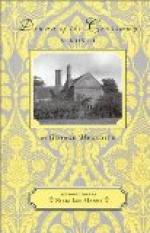feminine half of the world was a confusion and a vexation
to his intelligence, characterless; and one woman
at last appearing decipherable, he fancied it must
be owing to her possession of character, a thing prized
the more in women because of his latent doubt of its
existence. Character, that was the mark he aimed
at; that moved him to homage as neither sparkling
wit nor incomparable beauty, nor the unusual combination,
did. To be distinguished by a woman of character
(beauty and wit for jewellery), was his minor ambition
in life, and if Fortune now gratified it, he owned
to the flattery. It really seemed by every test
that she had the quality. Since the day when
he beheld her by the bedside of his dead uncle, and
that one on the French sea-sands, and again at Copsley,
ghostly white out of her wrestle with death, bleeding
holy sweat of brow for her friend, the print of her
features had been on him as an index of depth of character,
imposing respect and admiration—a sentiment
imperilled by her consent to fly with him. Her
subsequent reserve until they met—by an
accident that the lady at any rate was not responsible
for, proved the quality positively. And the
nature of her character, at first suspected, vanquished
him more, by comparison, than her vivid intellect,
which he originally, and still lingeringly, appreciated
in condescension, as a singular accomplishment, thrilling
at times, now and then assailably feminine.
But, after her consent to a proposal that caused him
retrospective worldly shudders, and her composed recognition
of the madness, a character capable of holding him
in some awe was real majesty, and it rose to the clear
heights, with her mental attributes for satellites.
His tendency to despise women was wholesomely checked
by the experience to justify him in saying, Here is
a worthy one! She was health to him, as well
as trusty counsel. Furthermore, where he respected,
he was a governed man, free of the common masculine
craze to scale fortresses for the sake of lowering
flags. Whilst under his impression of her character,
he submitted honourably to the ascendancy of a lady
whose conduct suited him and whose preference flattered;
whose presence was very refreshing; whose letters
were a stimulant. Her letters were really running
well-waters, not a lover’s delusion of the luminous
mind of his lady. They sparkled in review and
preserved their integrity under critical analysis.
The reading of them hurried him in pursuit of her
from house to house during the autumn; and as she did
not hint at the shadow his coming cast on her, his
conscience was easy. Regarding their future,
his political anxieties were a mountainous defile,
curtaining the outlook. They met at Lockton,
where he arrived after a recent consultation with
his Chief, of whom, and the murmurs of the Cabinet,
he spoke to Diana openly, in some dejection.
’They might see he has been breaking with his party for the last four years,’ she said. ‘The plunge to be taken is tremendous.’




